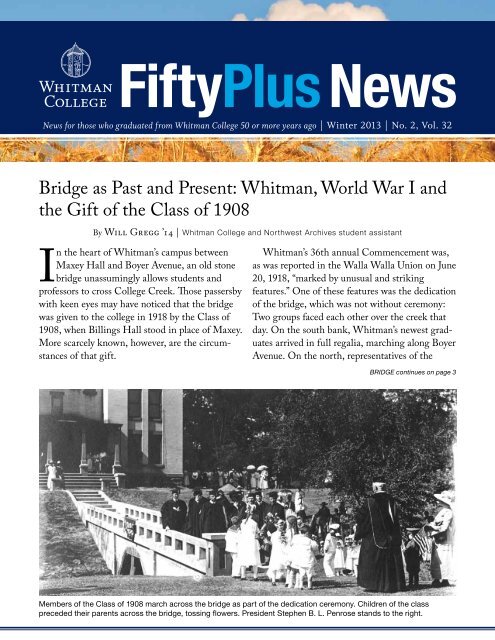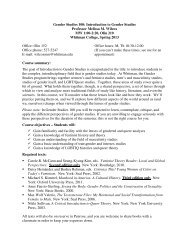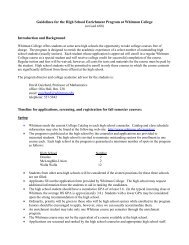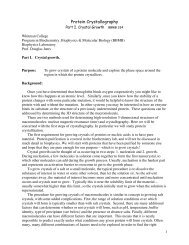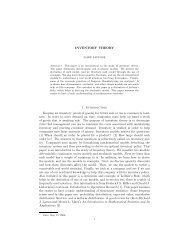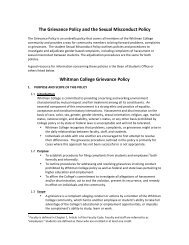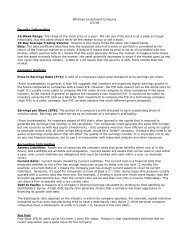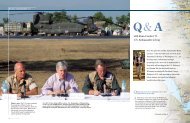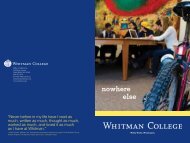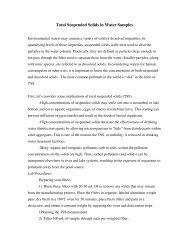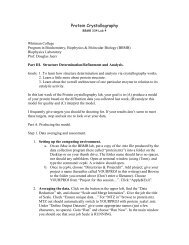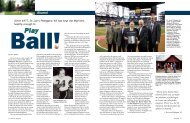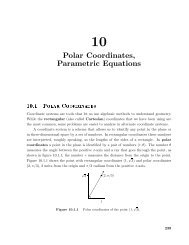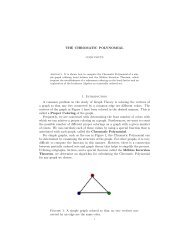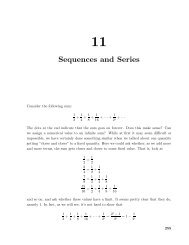Fifty Plus News - Whitman College
Fifty Plus News - Whitman College
Fifty Plus News - Whitman College
You also want an ePaper? Increase the reach of your titles
YUMPU automatically turns print PDFs into web optimized ePapers that Google loves.
<strong>Fifty</strong><strong>Plus</strong> <strong>News</strong><br />
<strong>News</strong> for those who graduated from <strong>Whitman</strong> <strong>College</strong> 50 or more years ago | Winter 2013 | No. 2, Vol. 32<br />
Bridge as Past and Present: <strong>Whitman</strong>, World War I and<br />
the Gift of the Class of 1908<br />
By Will Gregg ’14 | <strong>Whitman</strong> <strong>College</strong> and Northwest Archives student assistant<br />
In the heart of <strong>Whitman</strong>’s campus between<br />
Maxey Hall and Boyer Avenue, an old stone<br />
bridge unassumingly allows students and<br />
professors to cross <strong>College</strong> Creek. Those passersby<br />
with keen eyes may have noticed that the bridge<br />
was given to the college in 1918 by the Class of<br />
1908, when Billings Hall stood in place of Maxey.<br />
More scarcely known, however, are the circumstances<br />
of that gift.<br />
<strong>Whitman</strong>’s 36th annual Commencement was,<br />
as was reported in the Walla Walla Union on June<br />
20, 1918, “marked by unusual and striking<br />
features.” One of these features was the dedication<br />
of the bridge, which was not without ceremony:<br />
Two groups faced each other over the creek that<br />
day. On the south bank, <strong>Whitman</strong>’s newest graduates<br />
arrived in full regalia, marching along Boyer<br />
Avenue. On the north, representatives of the<br />
BRIDGE continues on page 3<br />
Members of the Class of 1908 march across the bridge as part of the dedication ceremony. Children of the class<br />
preceded their parents across the bridge, tossing flowers. President Stephen B. L. Penrose stands to the right.
<strong>Fifty</strong><strong>Plus</strong> <strong>News</strong><br />
<strong>Fifty</strong><strong>Plus</strong> <strong>News</strong><br />
Published by the <strong>Whitman</strong> <strong>College</strong><br />
Alumni Association<br />
W h i t m a n C o l l e g e s ta f f<br />
P r o d u c t i o n M a n ag e r / E d i t o r<br />
Rikki Gwinn, Alumni Office<br />
gwinnrl@whitman.edu<br />
D e s i g n e r<br />
Chris Bishop ’79<br />
C o n t r i b u t i n g W r i t e r s<br />
Will Gregg ’14<br />
P h o t o g r a p h y<br />
Greg Lehman<br />
a l u m n i O f f i c e s ta f f<br />
A s s i s ta n t v i c e p r e s i d e n t f o r<br />
a l u m n i r e l at i o n s<br />
Polly Schmitz ’83<br />
A s s o c i at e D i r e c t o r o f a l u m n i<br />
Nancy Mitchell<br />
A s s i s ta n t D i r e c t o r o f a l u m n i<br />
Jason Arp ’94<br />
a d m i n i s t r at i v e a s s i s ta n t<br />
Rikki Gwinn<br />
The Class of 1908 bridge provides a timeless and popular setting for photographers,<br />
whether today or decades ago.<br />
Submit to <strong>Fifty</strong><strong>Plus</strong> <strong>News</strong><br />
Please contribute, and encourage your classmates to contribute,<br />
stories, letters, photos and memories. We welcome<br />
stories about life at <strong>Whitman</strong> when you were here or things<br />
“<strong>Whitman</strong>-related” that have influenced your life in the intervening<br />
years. Stories should be 1,000 words or less.<br />
Send materials to:<br />
Rikki Gwinn<br />
c/o <strong>Whitman</strong> <strong>College</strong> Alumni Office<br />
345 Boyer Ave.<br />
Walla Walla, WA 99362<br />
or email gwinnrl@whitman.edu.<br />
2
Twenty-one graduates walk across the newly dedicated bridge toward the amphitheater, where the graduation ceremony<br />
would take place. Four graduates not present are listed as “Absent in the Service of the Nation” in the<br />
Commencement program and were conferred degrees in absentia.<br />
BRIDGE continued from page 1<br />
1908 class awaited them. Children of the class<br />
proceeded across the bridge, scattering flowers ahead of<br />
their parents, who followed. Reaching the other side,<br />
Edward Mason 1908 addressed the new graduates and<br />
President Penrose.<br />
The lofty style of his speech matched its attendant<br />
ceremony. The dominant theme running through the<br />
rhetoric was neither a list of <strong>Whitman</strong>’s various virtues<br />
nor a retelling of the Class of 1918’s fondest memories,<br />
but rather the other “striking” feature alluded to by the<br />
Walla Walla Union above: World War I.<br />
But do you suppose the real need of <strong>Whitman</strong> <strong>College</strong><br />
for this bridge is that students may cross the creek to<br />
science hall No, that is only half – that is only a small<br />
part of the reason. For, as I take it, this college sits, in<br />
the midst of war, like Moses of old upon the mountain<br />
top. When she raises her hands with the rod in them,<br />
there is some little part of the battle, extending through<br />
the cantonments and into the front line trenches in<br />
France, where the forces of righteousness fight the overcoming<br />
fight. And if she would lower her hands, that<br />
little bit of the battle tide would turn. But she needs<br />
someone to uphold her hands when they wax weary, as<br />
Moses had, and that is the reason for the bridge.<br />
This speech, like the speeches of the graduating class<br />
itself, were also centered on the war. Three students were<br />
selected to give orations that day. One was absent in<br />
domestic military service, and the other two spoke<br />
exclusively on wartime themes, the role of democracy<br />
and service of the greater good.<br />
The United States entered World War I in April 1917.<br />
By June 1918, when the Commencement was held, there<br />
were 188 stars stitched on a flag that hung in the<br />
college’s chapel. One hundred eighty-eight members of<br />
the <strong>Whitman</strong> community – graduates, undergraduates<br />
and professors – were involved directly in the war. By<br />
December 1918, after the Armistice, the list had grown<br />
to 345. And, of <strong>Whitman</strong>’s total enrollment for the<br />
1918-19 school year, of 310 students, at least 138<br />
students were involved in the military, whether in<br />
nursing, the armed services, or in the Student Army<br />
Training Corps.<br />
Given these numbers, it may not be entirely<br />
surprising that the war figured predominantly in<br />
<strong>Whitman</strong>’s collective mind. And yet <strong>Whitman</strong>’s campus<br />
and new bridge were still miles from Flanders Fields<br />
and the horrors of the trenches. Perhaps the distance<br />
enabled the orators to ignore the harsh realities of war<br />
Winter 2013 3
<strong>Fifty</strong><strong>Plus</strong> <strong>News</strong><br />
The alumni magazine <strong>Whitman</strong> Alumnus<br />
was often the most substantial connection<br />
that our small community had with its<br />
members overseas and vice versa. One<br />
soldier’s letter printed in the Alumnus<br />
states bluntly, “… perhaps this letter will act<br />
as a news-note to the effect that I am still<br />
in existence.”<br />
and instead focus on the ennobling aspects of service.<br />
Consider Commencement speaker Gertrude Goodspeed’s<br />
speech, “The New Individual,” given at the graduation<br />
ceremony:<br />
[T]housands upon thousands are gaining a practical,<br />
acting intelligence. Control of self, quick comprehension<br />
of unusual situations and the ability immediately<br />
to solve such situations are developed by actual experience<br />
in modern warfare. The actual intelligence of men<br />
is increasing, and as men advance in their intelligence,<br />
their moral judgment increases. They develop new<br />
values and new standards for valuing. Our aim here at<br />
home must be to keep pace with the moral evolution of<br />
the man at the front, so that, on his return, we shall not<br />
drag him back into his old ruts of selfishness and shiftlessness<br />
but push him upward and onward.<br />
Goodspeed does not address the physical or psychological<br />
challenges associated with warfare, but rather she<br />
views the experience of war as a moral boon. Whether<br />
or not this was true for those serving directly is not<br />
apparent from the graduation ceremony itself. What it<br />
does show, however, is that <strong>Whitman</strong> echoed the rest of<br />
the country in portraying the war as a great struggle for<br />
democracy. As Mason said in his speech, <strong>Whitman</strong>’s<br />
role was to provide “men of the kind the war needs.”<br />
Letters featured in the alumni magazine from former<br />
and current <strong>Whitman</strong> students overseas give us a<br />
glimpse, many years removed, into daily life there.<br />
Often the letter writers expressed a certain amount of<br />
homesickness:<br />
Kohlstaedt’s is a revealing optimism. The confidence<br />
of eventual victory and the informal language and tone<br />
combine to create a feeling of ease and reassurance. On<br />
the whole, <strong>Whitman</strong>ites reported fair conditions. As one<br />
said, “Many of the boys are doubtless feeding better<br />
than they did at home.” Still, soldiers did write about<br />
hardships and sad circumstances. One described a<br />
French woman who, employed with her daughter as a<br />
maid by the army for a time, had lost her husband and<br />
two sons to fighting and a third son to disease, and the<br />
fourth son was a prisoner of war. Some soldiers, at least,<br />
grew used to the steady and monotonous sounds of war,<br />
and one <strong>Whitman</strong>ite commented that, “I have got now<br />
so I can sleep right through the firing of our big guns<br />
not a 100 yards away or up at my observation post where<br />
the German shells come screaming over-head and burst<br />
with a loud smash.” While not focused on the harsh<br />
realities of war, these letters generally also do not depict<br />
war, as Commencement speaker Goodspeed suggested,<br />
as a daily moral triumph. Most <strong>Whitman</strong>ites were<br />
homesick (“Your letter with news of Commencement<br />
week filled in a gap for me”) or wrote about the<br />
mundane intricacies of promotion or training.<br />
The alumni magazine <strong>Whitman</strong> Alumnus was often<br />
the most substantial connection that our small community<br />
had with its members overseas and vice versa. One<br />
soldier’s letter printed in the Alumnus states bluntly,<br />
“… perhaps this letter will act as a news-note to the<br />
effect that I am still in existence.” Letters, service lists<br />
and news of domestic war efforts ran alongside more<br />
typical reports of the goings-on at <strong>Whitman</strong>, which<br />
those stationed overseas so appreciated.<br />
Believe me, here is one who would like to be there for<br />
the commencement and the alumni banquet and<br />
meeting, but that doesn’t alter the fact that we are glad<br />
to be serving our country. We certainly should be able<br />
to have a rousing ‘get-together’ as soon as we lick the<br />
Hun. (Levi Kohlstaedt ’17) Lloyd Gensel ’19, Bill Wilson ’20 and Harold Botts ’18<br />
standing to the left of an unidentified commander during<br />
military training in 1917.<br />
4
Letters to the Editor<br />
Editor’s Note: This Letter to the Editor was<br />
received regarding the feature titled “Reflections<br />
on arts and letters” in the Summer 2012 edition<br />
of <strong>Fifty</strong> <strong>Plus</strong> <strong>News</strong>. Do you have a story to share<br />
of someone who had an impact on your life as a<br />
<strong>Whitman</strong> student Please email Rikki Gwinn at<br />
gwinnrl@whitman.edu.<br />
Though a clear sky prevailed over <strong>Whitman</strong>’s 36th<br />
annual commencement on June 19, 1918, World War I<br />
was a dark cloud in the minds of all those present.<br />
Indeed, to a greater or lesser degree, the war was a part<br />
of everyone’s daily life at <strong>Whitman</strong>. It makes sense,<br />
then, that the dedication of the gift of the Class of 1908<br />
reflected this larger concern. For the <strong>Whitman</strong> community,<br />
the bridge represented a way to traverse troubled<br />
times. It was a symbol of the community’s strength and<br />
support. Today, the bridge is a convenient path over the<br />
same creek. But, as it was then, it is something more: It<br />
is itself a bridge to the past, to a time when the gesture<br />
of its dedication was needed.<br />
The gift of the <strong>College</strong> Creek Bridge from the Class of<br />
1908 is another example of the long and generous history<br />
of giving to <strong>Whitman</strong>. In 2011, <strong>Whitman</strong> launched the<br />
Now Is the Time Campaign. As is stated on the campaign<br />
website: In today’s increasingly complex and globally connected<br />
world … <strong>Whitman</strong> must broaden and deepen its rigorous and<br />
personalized education in the liberal arts and sciences. We must<br />
make a <strong>Whitman</strong> education more affordable. We must<br />
strengthen our financial base to better meet the educational<br />
needs of our students. Now is the time for an unprecedented<br />
commitment to <strong>Whitman</strong>’s students and the <strong>College</strong>’s future.<br />
For more information on the campaign, visit<br />
www.whitman.edu/campaign or call (509) 527-5165.<br />
On further reflection<br />
I so enjoyed the article focusing on Herr Fredrick<br />
Santler, as he was my favorite <strong>Whitman</strong> professor while<br />
I attended there from 1954-1958. I was a business<br />
administration/econ major, and I took German my<br />
sophomore year to fill my language requirement. I only<br />
had Herr Santler one year, but I still would vote him as<br />
my favorite professor. I had signed up for the second year<br />
of German when he became ill (a heart condition, I<br />
believe) and the class was taught by a senior student, and<br />
while that person was probably very good in German,<br />
after two classes, and the word that Herr Santler would<br />
not be able to teach that year, I decided that another<br />
year of German would not be to my liking.<br />
Herr Santler brought to the classroom much more<br />
than being able to speak and write German. While he<br />
was great at that, he interwove personal experiences into<br />
his lectures that made me (and I should use the pronoun<br />
“us”) look forward to his classes. As students, we lived<br />
during a time when economic activity in the U.S.A. was<br />
truly expanding, and there probably weren’t many<br />
students (if any) attending <strong>Whitman</strong> who experienced<br />
the hardships that Herr Santler did, and I have always<br />
thought it was great to learn of his hardships to make<br />
certain that the conditions he went through, as did most<br />
Austrians, were in the past, and we would hopefully<br />
never have to experience them.<br />
While he was growing up in Austria, the economy<br />
was truly in disastrous shape; I recently read where the<br />
unemployment reached 25 percent at that time. In one<br />
lecture, he spoke of how his family (his mom and dad<br />
and one sibling) would have a “gruel” (hot cereal) made<br />
of cracked wheat, oats and corn with a side dish of “one<br />
quarter of an egg each” (for a source of protein) for<br />
breakfast, as things were “so tight in Austria.” For a<br />
REFLECTION continues on page 6<br />
Winter 2013 5
<strong>Fifty</strong><strong>Plus</strong> <strong>News</strong><br />
Herr Santler in class, 1950.<br />
REFLECTION continued from page 5<br />
person raised on scrambled eggs, bacon or ham and<br />
toast, this made a lasting impression.<br />
He also talked of farming on his dad’s farm with two<br />
rather old work horses, and one day, out of the blue, one<br />
of the horses died, so they used a digging scoop behind<br />
the remaining horse, dug out a grave, and buried the<br />
deceased horse in that pit. The next day the dad went to<br />
the village and there was a street vendor selling Pferdefleisch,<br />
or horse meat, which was a rare occurrence in<br />
those days. The dad told them of the experience and<br />
they all went out to where they had buried their horse;<br />
sure enough, the horse had been dug up, and apparently<br />
was what the vendor was selling. There were no gasps of<br />
disbelief or gagging, just silence. We could learn of such<br />
hardships that we never knew existed.<br />
Sometime after that, the family didn’t like what was<br />
happening in the economy and the fact the Nazis were<br />
positioning themselves to take over Austria, which they<br />
did without a war, so they migrated to the U.S.A. before<br />
World War II. I’m glad they did and that Herr Santler<br />
and his family came to Walla Walla. I’m so glad our<br />
paths crossed at <strong>Whitman</strong>.<br />
At the time, I never got to thank Herr Santler for<br />
enriching my <strong>Whitman</strong> experience that one year; I never<br />
have forgotten it or him, but it bothered me. I didn’t get<br />
the chance to personally thank him for such a great<br />
class. Some 30 years later, I was in Frankfurt on business<br />
there for General Mills as I had organized and<br />
managed a commissary and exchange sales operation<br />
worldwide, and would go there two to four times a year.<br />
On my first trip, I had written down the address of<br />
<strong>Whitman</strong> <strong>College</strong>, not knowing if Herr Santler was still<br />
enlightening the student body with his teachings, but if<br />
he was “still with us” at the time, I knew they would<br />
forward letters to him. While at a restaurant at the hotel<br />
where I was staying, I started a letter to Herr Santler,<br />
and with the help of a waitress, wrote three paragraphs<br />
in German thanking him for his talent, his patience and<br />
his dedication to his craft in teaching us German. I then<br />
went on in English to add this letter was long overdue,<br />
but the impact he made on me would last a lifetime, and<br />
I wanted him to know that.<br />
I even added there was a possibility that he might not<br />
remember me after 30 years, so I mentioned I was from<br />
Joseph, Ore., as was another Herr Santler admirer, Ivan<br />
“Butch” Hovis ’58. I also mentioned I was including<br />
Pete Reid ’49 on the correspondence, so as to insure the<br />
letter got to him.<br />
Some six weeks after returning to the U.S., I hadn’t<br />
heard anything from Herr Santler, so I called Pete Reid,<br />
who as the Phi Delt adviser when I attended school had<br />
helped me immensely. I asked him if he had gotten a<br />
copy of my letter, which he had, and if he had any idea<br />
that Herr Santler had received it. I was so pleased when<br />
he said to the effect that Herr Santler had received it,<br />
and while he was no longer active at <strong>Whitman</strong>, recently<br />
(at that time) he had attended a luncheon, as did Pete,<br />
and he was sharing my letter with his friends at the<br />
college and that he was pleased to have received it.<br />
The very next week, I got a letter from Herr Santler,<br />
stating he, indeed, remembered the two Joseph, Ore.,<br />
lads, and he appreciated the kinds words I’d expressed<br />
while on that trip to Germany.<br />
While a long time had gone by, we had reconnected<br />
for a short time; I felt good about FINALLY thanking<br />
a talented professor for a job exceptionally well done,<br />
as he passed away just a short period of time after that.<br />
I would like to think we both felt good about<br />
reconnecting.<br />
I’m glad Helen Haigh Mills’ ’44 reflections were<br />
included in the <strong>Fifty</strong> <strong>Plus</strong> <strong>News</strong>. I cut it out and put it in<br />
the 1958 Annual.<br />
Kindest personal regards,<br />
Ed Newton ’58<br />
edmar1044@gmail.com<br />
6
Make a gift to support<br />
<strong>Whitman</strong> and receive<br />
guaranteed income for life!<br />
Charitable Gift Annuity Sample Rates<br />
Tax-Free Effective<br />
Annuity Annual Portion of Charitable After-Tax<br />
Age Rate Payments Payments Deduction Rate*<br />
70 5.1% $1,275 $1,026 $8,673 7.1%<br />
75 5.8% $1,450 $1,189 $10,254 8.2%<br />
80 6.8% $1,700 $1,418 $11,673 9.8%<br />
85 7.8% $1,950 $1,685 $13,547 11.6%<br />
90 & older 9.0% $2,250 $1,971 $15,339 13.7%<br />
* Assumes 25% income tax rate and $25,000 cash funding.<br />
If you have any questions about gift annuities or other options to<br />
support <strong>Whitman</strong> <strong>College</strong>, please contact the Office of Gift Planning<br />
or visit the gift planning website: www.whitman.edu/gp<br />
Jamie Kennedy ’96 • (509) 527-5989 • kennedjj@whitman.edu<br />
Winter 2013 7
<strong>Fifty</strong><strong>Plus</strong> <strong>News</strong><br />
1950<br />
Remembering the SUB<br />
Late 1960s<br />
8
Like many others, I spent hours<br />
playing bridge in the SUB when I<br />
had less free time and should<br />
have been studying. Now that I<br />
have a little more free time, I can’t<br />
find anyone in the vicinity who<br />
plays bridge. Does anyone under<br />
70 still play the game My best<br />
memory of evening functions at<br />
the SUB was when the Gateway<br />
Singers put on their show singing<br />
“Puttin on the Agony, Puttin on<br />
the Style.” My grandkids like to<br />
sing it with me.<br />
– Dan O’Neal ’56<br />
My best SUB memory: the (Tues)<br />
evening dances. I called a pretty<br />
frosh early in my senior year, and<br />
we’ve never looked back. Hearing<br />
“Chances Are” on the oldies<br />
station occasionally brings back<br />
the memory of our first dance<br />
together at the SUB.<br />
– Don and Barb Leonard ’58<br />
The SUB was the campus hub for socializing, having a snack or checking one’s<br />
mailbox for that treasured letter from home, as seen in this 1950s photo.<br />
Many of us met future spouses in<br />
the SUB for coffee, a Coke, an ice<br />
cream cone in the spring or a<br />
dance. Count me among them!<br />
Raye Murray ’56 and I have been<br />
married for 55 years. Our son-inlaw<br />
(Stephen Morris ’80) flipped<br />
burgers at the SUB a generation<br />
later when our daughter (Robin<br />
Murray Morris ’80) met with him.<br />
– Jan Rubey Murray ’58<br />
The SUB, 1990s.<br />
Things that come to mind are<br />
the dents in Jim Ladley’s ’58<br />
green Chevy when he tried to<br />
drive between the posts around<br />
the parking area; a stripped<br />
Christmas tree, thanks to the<br />
Phantom; or the time there was<br />
“the Phantom almost died here”<br />
sign on the top of the old car in<br />
Lakum Duckum.<br />
– Arnold Coe ’58<br />
Reid Campus Center (the SUB of today) opened in 2002.<br />
Winter 2013 9
<strong>Fifty</strong><strong>Plus</strong> <strong>News</strong><br />
The <strong>Whitman</strong><br />
Letter Project<br />
The <strong>Whitman</strong> Letter Project gathered letters<br />
from <strong>Whitman</strong> alumni in the classes of 1969<br />
to 1973, written by or to them during their<br />
college years, and from excerpts of those<br />
letters created a script which was presented<br />
on stage at the April 2012 reunion. We’re<br />
expanding this project and are grateful<br />
others are sending their letters.<br />
July 17, 2012<br />
<strong>Whitman</strong> Letter Project:<br />
Enclosed are a few letters I wrote home while I was<br />
attending <strong>Whitman</strong> during 1949-50 and also some<br />
correspondence I received from <strong>Whitman</strong>.<br />
A glimpse into campus life during those years is<br />
amazing – students leaving home and attending college<br />
were so closely monitored in every aspect. The house<br />
mother who signed us in and out and guarded the door<br />
made sure no boys went past the small reception area of<br />
our dorm. The dress code on campus, and especially the<br />
formality of dining hall, wouldn’t be believed by present<br />
day students. I, for one, took it all for granted and never<br />
felt I was overly supervised. I fondly recall the house<br />
mother shouting, “Man in dorm,” when a male was<br />
admitted to repair something. The big excitement in<br />
those days was being serenaded outside one’s dorm<br />
window by your boyfriend’s fraternity, and the thrilling<br />
arrival of a Bendix washing machine – we didn’t have to<br />
mail our laundry home or drag it into town to be<br />
washed! Of course, there was no TV, and we all guarded<br />
our radios! My “dorm” was Jacobs House – one of the<br />
three army prefabs.<br />
One oddity I recall was the smoking in classrooms.<br />
Seems strange nowadays to think back to some,<br />
including the professor, puffing away during class.<br />
I wrote many letters – I must have written home<br />
nearly every day! More than a few of the letters stressed<br />
my preoccupation with the Tennessee Valley Authority<br />
project. Apparently, it was for a term paper – I am happy<br />
to report I received the top grade!<br />
If any more letters are needed for your project, I will<br />
be happy to send more.<br />
Sincerely,<br />
Carolyn Drennan Bishop ’53<br />
Tuesday<br />
April, 1950<br />
Dear Mother,<br />
Lots of things have happened since my last letter. You<br />
wouldn’t know the campus. It’s plastered with campaign<br />
posters and campaign jibes. Remember when we read in<br />
the <strong>Whitman</strong> book about the ingenious campaigns held<br />
every year Well, we’re having them now. Kids from all<br />
the different sororities and fraternities – and the Indies,<br />
too – took sleeping bags and slept under all the trees on<br />
campus so that they could have the night to hang their<br />
posters on that particular tree. On the way to breakfast,<br />
you could see the kids still sleeping under the trees.<br />
Promptly at 11 a.m., when the clock tower struck,<br />
everyone on campus started madly fighting for places to<br />
put up posters and signs and jibes. The whole campus<br />
was made a turmoil. A loud speaker played music, and<br />
inside of 10 minutes, every tree, building and dorm was<br />
covered with posters.<br />
Wednesday<br />
Today the campus was really a turmoil. There are<br />
dozens more posters and signs up, and all day long, there<br />
were big campaign tricks. To give you an example, here<br />
are some of the things that happened. The Phi Delts got<br />
a real bathtub and mounted it on a stand with wheels on<br />
it, and three boys with bathing suits on sat in it, and<br />
they were kept supplied with warm water and soap suds,<br />
and they had big brushes to wash their backs. They were<br />
pulled all over campus, and as they went, they sang<br />
“Rub a dub dub, three men in a tub, vote For Cub!”<br />
Also, the Phi Delts had two guys dressed up really<br />
weirdly. One had a bloody axe. He was bloody all over,<br />
and he was carrying a dead chicken in his hand. He<br />
wandered all over campus all day and through the<br />
10
dining hall. The other guy had big fake cuts and bruises<br />
all over, and he had a big long chain tied to his ankle<br />
which he dragged around when he walked his slow<br />
Frankenstein walk. The Beta Theta Pis had the funniest<br />
old car they had all painted up, and they drove it around<br />
all day. The Tekes had an old outhouse sitting on<br />
campus with “Headquarters for Esary, our candidate”<br />
written on it. At 10 minutes to 1 p.m., a boy dressed in a<br />
real funny old fashioned bathing suit and a shower cap<br />
dove into Lakum Duckum, and swam, or rather floundered,<br />
across it. On one bank it said “Calais,” and on the<br />
other side, “Dover.” All day long, two boys rode a<br />
tandem bike all over campus and sang “Daisy, Daisy,”<br />
only they used their own words to campaign for their<br />
candidate. The Beta Theta Pis had a live goat on campus<br />
with a sign on it that said “This kid is voting for<br />
MacKinney.”<br />
All the girls in the Alpha Chi sorority wore really<br />
funny red wigs with bangs to classes all day. They were<br />
campaigning for their candidate, who is a red head.<br />
Other sorority girls whose candidate is June Bowen wore<br />
their skirts pulled up, and you could see their slips and a<br />
sign that said “I’m showin’ for Bowen.” Some other cute<br />
tricks this sorority used included having girls standing<br />
around playing violins with signs on them that said: “I’m<br />
bowin’ for Bowen”; they also had cute, little, painted<br />
flowers sticking up all over in the grass with a sign that<br />
said, “I’m growin’ for Bowen.”<br />
The girls from the Tri Delts rode horses around all<br />
day long with signs on their backs saying “This Jockey is<br />
voting for Herman, you know her record.”<br />
The Alpha Phis had really cute Burma-Shave signs<br />
set up along all the walls, so you could see them as you<br />
walked along.<br />
In our English class, there are rows of pictures of old<br />
Greek and Roman scholars all attached together, and<br />
when we came to class today, someone had slipped in a<br />
picture of one of the boy candidates over the picture of<br />
one of the Greeks. It looked so funny. Our English<br />
professor got quite a kick out of it, too.<br />
Also at dinner every night a different group of fraternity<br />
boys hash us. Boy do they do a funny job of serving.<br />
Tonight the Indie men hashed us. At meals at each plate<br />
there are lots and lots of funny favors with funny<br />
campaign sayings on them, such as a matchstick that<br />
said “Pato, no match vote for her.”<br />
Tonight (it’s midnight now) the boys have been clustered<br />
around the dorm since 11 p.m. Just one fraternity<br />
leaves, and another comes. They are beating drums and<br />
blowing sirens and singing. They have big torches and<br />
are dressed in sheets. It’s really an impressive sight to see<br />
a whole string of them come single-file across the<br />
campus. Earlier this evening, the Tekes had a big truck<br />
with a piano and band on it, and they cruised all around.<br />
This afternoon, Dick and Dolores and I went to the<br />
park and fed the ducks and got some pictures of them.<br />
Also, we fooled around and somehow Dick’s sock got<br />
out in the middle of the water, and he had to wade out<br />
and get it, and his pants got soaking wet, and he had to<br />
go back to the dorm like that. Dee and I just about died<br />
laughing, and we got some pictures of him too.<br />
Also, we got just dozens and dozens of pictures of the<br />
campus with its posters all up. We get them back Friday,<br />
so I’ll mail them, too.<br />
Oh yes, one fraternity has been wearing these great<br />
big noses and great big black, horn-rimmed glasses all<br />
over.<br />
May Fete is May 5, 6, 7. Please come. It’s the big<br />
affair of the year, and everyone’s parents will be coming.<br />
It’s Parents Weekend. There will be a big May Fete show<br />
outside and a banquet outside and a dance, a tea, etc.<br />
Please come!!<br />
I finally got the battery for my radio that Wa-Wa and<br />
Dad were going to buy me when they were here once. It<br />
was $5. Do you care<br />
Love,<br />
Carol<br />
Do you have materials you’d like to donate to the<br />
<strong>Whitman</strong> Letter Project The project has been<br />
updated to include information about how to<br />
contribute letters. See www.whitmanletterproject.<br />
com, then click on the tab at the top of the page<br />
titled Contribute Letters. Please note that the<br />
post office box in Seattle has now been closed;<br />
materials should be sent to:<br />
<strong>Whitman</strong> <strong>College</strong> Alumni Office<br />
Attn: <strong>Whitman</strong> Letter Project<br />
345 Boyer Ave.<br />
Walla Walla, WA 99362<br />
Contact Melissa Salrin, archivist at <strong>Whitman</strong><br />
<strong>College</strong> and Northwest Archives, with any<br />
questions or concerns: salrinmm@whitman.edu<br />
or (509) 526-4731. Thank you in advance for your<br />
assistance in allowing us to make these letters<br />
more widely accessible and useful for scholarship.<br />
Winter 2013 11
<strong>Fifty</strong><strong>Plus</strong> <strong>News</strong><br />
50, 60, 70 years ago in The Pioneer<br />
Dec. 9, 1943<br />
Dr. Anderson Makes Talks<br />
Dr. Winslow S. Anderson, <strong>Whitman</strong><br />
<strong>College</strong> president, is speaking<br />
today on “The <strong>College</strong>s Go to War”<br />
before an annual three-day conference<br />
of the Northwest Association<br />
of Secondary and Higher Schools at<br />
Missoula, Mont.<br />
This organization includes<br />
colleges and secondary schools in<br />
Oregon, Washington, Alaska,<br />
Montana, California, Idaho, Nevada<br />
and Utah, and is responsible for all<br />
matters concerning them, including<br />
accrediting institutions of learning<br />
in those regions.<br />
The address of Dr. Anderson is<br />
one of a two-week series that began<br />
when he gave a speech Monday for<br />
the Kiwanis club at Pomeroy titled<br />
“Now Is the Time … ”<br />
“Independence or Charity” will<br />
be the subject of his next address to<br />
be given before the Yakima Kiwanis<br />
club Tuesday.<br />
The same afternoon, Dr. Anderson<br />
will speak to the Woman’s<br />
Century Club of Yakima concerning<br />
“True Freedoms or False Freedoms.”<br />
Nov. 19, 1953<br />
Placement Service Locates Jobs<br />
for Students, Alumni<br />
The total number of students with<br />
employment grants placed by the<br />
<strong>Whitman</strong> employment service is<br />
about 140, reports Kenneth Hupp,<br />
assistant to the president. In addition,<br />
approximately 80 students have<br />
been placed by the placement service<br />
in jobs both on and off campus.<br />
“An unknown number have regularly<br />
engaged in incidental part-time<br />
jobs, such as baby-sitting, lawn<br />
work, house-cleaning and retail<br />
clerking,” added Mr. Hupp.<br />
Meeting Planned<br />
Later in the year, a meeting for<br />
seniors will be held, at which time<br />
the procedure involved in registering<br />
and placing interested and qualified<br />
students will be outlined, he<br />
announced. Personnel representatives<br />
from several corporations, state<br />
and federal civil services and special<br />
professional and non-professional<br />
graduates will visit the campus from<br />
time to time during the winter to<br />
explain to senior students their<br />
personnel needs and to offer employment<br />
to those qualified.<br />
Mr. Hupp urges seniors to avail<br />
themselves of the placement service<br />
and to take advantage of meeting<br />
with as many of these visiting representatives<br />
as possible through<br />
appointment schedules.<br />
12
Service Finds<br />
The placement service is also<br />
concerned with finding satisfactory<br />
positions for teaching graduates. The<br />
placement office registers senior<br />
teaching majors and acts as a clearing<br />
agent for teaching vacancies it<br />
receives on the one hand and qualifications<br />
and needs of teaching registrants<br />
on the other.<br />
After returning from the meeting<br />
of the Northwest Association of<br />
<strong>College</strong> Placement officials at<br />
Ellensburg Nov. 2 and 3, Mr. Hupp<br />
said, “There will continue to be acute<br />
shortages of qualified teachers at<br />
several levels and a general shortage<br />
of college-trained personnel for business<br />
and industry next year despite<br />
the truce in Korea.”<br />
Dates of senior placement meetings<br />
will be published in The<br />
Pioneer and will also be publicized<br />
by oral announcements in the various<br />
residences.<br />
Nov. 14, 1963<br />
Summer Work in Europe<br />
Available to Students<br />
The American Student Information<br />
Service, with headquarters in<br />
Grand Duchy of Luxembourg, is<br />
now accepting applications from<br />
U.S. college students who wish to<br />
work in Europe next summer.<br />
The ASIS can place students in<br />
temporary summer work in Great<br />
Britain, France, Germany, Switzerland,<br />
Italy, Spain, Sweden, Finland,<br />
Norway, Luxembourg, Belgium,<br />
Holland, Austria, Israel and<br />
Liechtenstein.<br />
Wages range up to $400 a month<br />
for the highest paying positions in<br />
West Germany.<br />
Orientation in Europe<br />
Every student placed in a summer<br />
job in Europe attends a 5-day orientation<br />
period in Grand Duchy of<br />
Luxembourg that includes cultural<br />
orientation tours to Germany,<br />
France, Belgium, Holland and<br />
Luxembourg; blackboard sessions;<br />
and on-the-scene language practice.<br />
Students may also attend lectures<br />
given by European university<br />
professors.<br />
The ASIS, a non-profit organization<br />
in its seventh year of operation,<br />
also supplies job applicants, at no<br />
extra cost, with a complete set of<br />
records of the language of the country<br />
in which the applicant will be<br />
working.<br />
Travel Grants to $1,000<br />
The ASIS also offers travel grants<br />
that greatly reduce the cost of the<br />
summer in Europe. These grants can<br />
range as high as $1,000 depending<br />
upon individual circumstances.<br />
Student applicants are also free to<br />
make their own travel arrangements<br />
to and from Europe.<br />
Students interested in summer<br />
work in Europe should write to<br />
Dept. I American Student Information<br />
Service, 22 Avenue de la<br />
Liberte, Luxembourg City, Grand<br />
Duchy of Luxembourg, for the ASIS<br />
24-page prospectus, which includes<br />
a complete listing of jobs available,<br />
and job and travel grant applications.<br />
Send $1 for the prospectus and an<br />
air mail reply.<br />
5,000 Openings<br />
ASIS has 5,000 job openings<br />
within categories that include resort<br />
hotel work, office work, child care<br />
work, ship work, construction work,<br />
farm work, sales work and camp<br />
counseling work.<br />
Winter 2013 13
<strong>Fifty</strong><strong>Plus</strong> <strong>News</strong><br />
Drawing (detail) from the 1943 edition of Waiilatpu. Artists: Genevieve Shaw, Verna Sinema and Virginia King.<br />
50 years ago …<br />
“Mutual of Omaha’s Wild<br />
Kingdom” with Marlin<br />
Perkins begins on NBC.<br />
60 years ago …<br />
Actor Desi Arnaz, Jr.<br />
is born in Los Angeles.<br />
70 years ago …<br />
What things cost:<br />
Car: $1,100<br />
Gasoline: 19 cents per gallon<br />
House: $8,000<br />
Bread: 9 cents per loaf<br />
Milk: 62 cents per gallon<br />
Postage stamp: 3 cents<br />
Average annual salary: $2,500<br />
Minimum wage: 30 cents per hour<br />
14
2013 <strong>Fifty</strong>-<strong>Plus</strong> Reunion Weekend<br />
Friday, June 21, through Sunday, June 23, 2013<br />
Join alumni from the Classes of 1962 and earlier for a weekend on the<br />
<strong>Whitman</strong> <strong>College</strong> campus. There will be special celebrations for the following classes:<br />
55th Reunion for the Class of 1958<br />
60th Reunion for the Class of 1953<br />
65th Reunion for the Class of 1948<br />
As plans develop you will receive additional information.<br />
Watch the Reunion website for updates at<br />
www.whitman.edu/reunions.<br />
Questions Contact the Alumni Office at 1-800-835-9448 ext. 1<br />
or gwinnrl@whitman.edu<br />
The <strong>Whitman</strong> <strong>College</strong> Alumni Association<br />
345 Boyer Ave., Walla Walla, WA 99362<br />
WHITMAN<br />
history 101<br />
MAY 25, 1903<br />
The Roosevelts visit <strong>Whitman</strong> <strong>College</strong><br />
On May 25, 1903, President Theodore Roosevelt addressed a crowd of 6,000<br />
on the Memorial Hall grounds. The visit was “part of a campaign to gain<br />
western support for his forthcoming bid for the presidency,” according to the<br />
website HistoryLink.com.<br />
2013 <strong>Fifty</strong>-<strong>Plus</strong> Reunion Weekend<br />
Friday, June 21, through Sunday, June 23, 2013<br />
Below: The original Prentiss Hall is decorated for the festive occasion.<br />
Prof. Howard Brode,<br />
who taught biology<br />
courses at <strong>Whitman</strong><br />
from 1899 until 1936,<br />
photographed the<br />
historic visit. In addition<br />
to his teaching<br />
duties, Brode also<br />
served as curator of<br />
the <strong>Whitman</strong> Museum.<br />
Image and information<br />
are courtesy of the<br />
<strong>Whitman</strong> <strong>College</strong> and<br />
Northwest Archives.<br />
Join alumni from the Classes of 1962 and earlier for a weekend on the<br />
<strong>Whitman</strong> <strong>College</strong> campus. There will be special celebrations for the following classes:<br />
55th Reunion for the Class of 1958<br />
60th Reunion for the Class of 1953<br />
65th Reunion for the Class of 1948<br />
As plans develop you will receive additional information.<br />
Watch the Reunion website for updates at<br />
www.whitman.edu/reunions.<br />
Questions Contact the Alumni Office at 1-800-835-9448 ext. 1<br />
or gwinnrl@whitman.edu<br />
The <strong>Whitman</strong> <strong>College</strong> Alumni Association<br />
345 Boyer Ave., Walla Walla, WA 99362<br />
Winter 2013 15
345 Boyer Ave.<br />
Walla Walla, WA 99362<br />
Trips, tours & events<br />
Alumni and friends of <strong>Whitman</strong><br />
are invited to join in the fun.<br />
The Revolutionary War<br />
with Prof. David F. Schmitz, Robert Allen Skotheim chair of history<br />
May 20-31, 2013<br />
$4800 per person double occupancy<br />
More than a tour, this visit to historic<br />
sites in Boston, New York and<br />
Philadelphia is a unique exploration of<br />
the birth of America. Led by one of<br />
<strong>Whitman</strong>’s most distinguished faculty<br />
members, and accompanied by local<br />
experts, this unique journey will<br />
immerse you in the lives and decisions<br />
of the founders. Prof. Schmitz’s lectures<br />
and discussions will provide a glimpse<br />
into the excellent education offered at<br />
<strong>Whitman</strong> today.<br />
The Oregon Shakespeare Festival<br />
with Prof. Theresa DiPasquale,<br />
department of English chair<br />
August 2-5, 2013<br />
Enjoy this annual theater<br />
experience in the lovely<br />
town of Ashland, Ore.,<br />
along with a presentation by<br />
Prof. DiPasquale, discussions,<br />
and the camaraderie<br />
of shared meals and<br />
conversations with fellow<br />
play-goers. Lodging at the<br />
Ashland Springs Hotel in<br />
downtown Ashland, one<br />
block from the theaters.<br />
Eastern Washington geology and history<br />
with Prof. Patrick Spencer, professor of geology, and<br />
Prof. David F. Schmitz, Robert Allen Skotheim chair of history<br />
Oct. 11-15, 2013<br />
Ice, floods, a coulee and a dam with Prof. Patrick Spencer and Prof. David Schmitz.<br />
Learn about lava flows and ice, the Missoula floods, and the people who envisioned<br />
and built the largest hydropower project in the United States. This trip is currently<br />
sold out; please contact the Alumni Office to be wait-listed.<br />
MORE INFORMATION ON ALUMNI TRIPS<br />
For brochures, visit www.whitman.edu/alumnitrips. For details, email Margaret Hoglund at<br />
hoglund@whitman.edu or call the Alumni Office at (509) 527-5167 or (800) 835-9448, ext. 1.<br />
Income generated from participation in the<br />
<strong>Whitman</strong> <strong>College</strong> Alumni Association travel<br />
program is used to pay for the travel expenses<br />
of faculty and staff and the promotional costs<br />
associated with the travel program.


